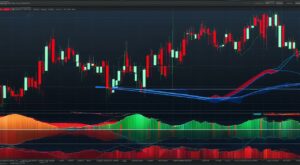Your cart is currently empty!
What is Haram Aspects of Using Leverage in Forex?

Affiliate Disclaimer: This post may contain affiliate link or links
The thriving world of Forex is a global marketplace that is attracting a diverse range of participants, including those who adhere strictly to the dictates of Islamic law, Shariah.
Engaging in excessive leverage in Forex trading is deemed Haram, as it violates Islamic principles of risk-sharing and prohibits speculative behavior. While less usage of leverage is seem as halal.
Contents
These participants seek to engage in clear halal practices and steer away from activities explicitly considered clear haram, sinful, and unlawful.
This presents a delicate balance, particularly when considering the subtle nuances of trading concepts such as leverage and margin trading.
Understanding the prohibition of interest, riba, usury in Islam is vital, as these concepts often bring uncertainty in Forex practices.

Understanding Forex Trading
Forex trading focuses primarily on the trading of currency pairs and the fluctuation in exchange rates.
It is a process of buying and selling currencies, with these transactions often hinged on predicting or understanding changes in currency exchange rates between trading pairs.
Central to this Forex market is the use of leverage. Leverage in Forex refers to the use of borrowed capital (margin) in the hope of amplifying potential profits.
However, this also heightens the risk and uncertainty due to currency value fluctuation and volatility.
| Pros of Forex TradingCons of Forex Trading | |
|---|---|
| 1. 24-hour Market: Forex trading runs 24 hours a day, five days a week, accommodating all time zones. | 1. High Risk: Forex trading is known for being a risky investment due to market volatility. |
| 2. High Liquidity: With a massive number of participants, the Forex market has high liquidity, allowing trades at most times. | 2. Requires Knowledge: Entering the Forex market without proper understanding or education can result in significant losses. |
| 3. Low Entrance Barrier: You can start forex trading with a relatively small capital compared to other markets. | 3. Leverage Risk: While leverage can magnify profits, it can also magnify losses, leading to negative balance. |
| 4. Flexibility: Forex trading can cater towards short-term scalpers to long-term position traders. | 4. Psychological Stress: Market volatility can cause emotional distress and anxiety, especially to new traders. |
| 5. Profit from both rising and falling markets: Forex traders can make profit whether the market is rising or falling. | 5. High Competition: Forex trading is highly competitive, with professionals from banks and hedge funds on the playing field. |
| 6. No Commission: In most cases, brokers don’t charge commission, they make their money from spreads. | 6. Overtrading: Due to 24-hour market, traders can be tempted to trade excessively, which can lead to fatigue and poor decision-making. |
| 7. Variety of trading pairs: Numerous currency pairs to choose from including majors, minors and exotics. | 7. Potential for Fraud: Not all forex brokers are reputable, so due diligence is necessary to avoid scams or fraudulent brokers. |

Haram Aspects of Using Leverage in Forex
The use of leverage in forex trading sparks considerable debate within the Islamic community. On the one hand, it enables an investor to gain larger exposure to the market while using relatively less of their capital.
However, it also ramps up the level of risk and uncertainty, tapping into prohibited areas of speculation, gambling, and maysir in the Islamic context.
According to various interpretations of the Quran and hadith, these traits make leveraged forex trading, particularly speculative, deemed as haram under Islamic law.
| Haram Aspects in Using Leverage in Forex Trading |
|---|
| 1. Use of Riba: Interest charged on leveraged positions could result in the exchange of uninterruptible profits, considered haram in Islam. |
| 2. Gambling/Maysir: Excessive speculation in leveraging could be considered a form of gambling, which is haram. |
| 3. Uncertainty (Gharar): Uncertain outcomes from leveraging can be considered Gharar, or deception, which is also haram. |
| 4. Excessive Debt: Leveraging can lead to significant debts, prohibited in Islamic finance. |
| 5. Unethical Practices: Using leverage with the sole aim of making large profits might contradict the ethical principles of Islamic finance, where the emphasis is on just and fair financial dealings. |
| 6. Short Selling: Leveraged forex trading often involves short selling, a practice considered haram under Islamic law. |
| 7. Day Trading: Using leverage in day trading comes with significan risk and speculation, thus can be seen as haram. |
| 8. Use of Derivatives: Leveraged positions may necessitate the use of derivatives contracts, which contain elements of uncertainty, therefore considered haram. |

Forex and the Concept of Riba
An integral part of the discourse on Forex trading within Islamic contexts revolves around the notion of riba.
Riba, or interest, can become part of Forex trading through broker fees, rollover fees, and overnight financing that may accrue on leveraged positions.
Such scenarios could lead to the charge or receipt of interest, strictly forbidden, or haram, in Islam.
| Concept of Riba in Islam |
|---|
| 1. Definition: Riba, in Islamic law, refers to “unjustified increment in borrowing or lending money, paid in kind or in cash over the loaned amount”. It is usually translated as “interest” or “usury”. |
| 2. Types of Riba: There are two types of Riba – Riba al-nasiyah (charging interest on loans) and Riba al-fadl (excessive gain without any counter-value benefiting the other side). |
| 3. Prohibition: Riba is strictly prohibited in Islam as per the teachings in the Quran and Hadith. |
| 4. Reason for Prohibition: Riba is forbidden as it is seen as a form of exploitation of the poor, creates social disparity and promotes a wealth accumulation system at the expense of others. |
| 5. Exceptions: There are no known exceptions for Riba within Islam. All forms of interest are considered Riba and are hence prohibited. |
| 6. Implications: Engaging in Riba is considered a major sin in Islam and can affect a Muslim’s afterlife as well as their status within the community. |
| 7. Alternatives: Islamic finance offers alternatives to interest-based transactions through models like profit-sharing (Mudarabah), cost-plus (Murabahah), and leasing (Ijarah). |

Prohibition of Excessive Debt and Loans in Islamic Law
Islamic law strongly discourages the accrual of excessive debt and loans, a potential pitfall of leveraged Forex trading.
If a trader utilizes extreme leverage, they run the risk of accumulating substantial debt, especially if market movements are not in their favor.
The hadith and Quran express clear warnings against the dangers of debt, further emphasizing this prohibition.
Haram Practices: Short Selling, Day Trading, and Derivatives
Short selling, day trading, futures, options, derivatives, and contracts for difference (CFDs) can often be seen as haram.
These financial instruments involve significant speculation, bordering on gambling, which goes against the principles of the Shariah.
The uncertainty and risk associated with such practices makes them forbidden in Islamic finance.

Measures to Keep Forex Trading Halal
Maintaining a halal approach to Forex trading can be challenging but possible. Traders must steer clear of maysir (gambling), avoid greed, materialism, and sinful intentions.
Traders can uphold ethics in Forex trading by having a sound understanding of the market dynamics, carefully selecting their trading pairs, and cautiously using leverage.
They should aim to avoid prohibited practices as much as possible and try to stick to clear halal means of trading.
Necessary Knowledge of Forex Rates and Volatility
Knowledge of forex rates and understanding of the volatility of the forex market is essential in forex trading.
This can help traders minimize risk and the uncertainty associated with fluctuation in currency exchange rates, thus reducing the haram aspects of forex trading.
Impact of Leverage on Profit, Loss, and Gain
The use of leverage can drastically affect one’s profit, loss, and gain. While the leverage-induced potential for high rewards can seem attractive, it also intensifies the risk of substantial losses.
This heightened risk could lead traders to a shift in their financial stability, potentially incurring excessive debt, which is also a haram aspect of leverage in forex.

Conclusion
In conclusion, while the Forex market offers attractive financial instruments and opportunities for traders, it’s crucial for Islamic traders to cautiously consider the haram aspects of using leverage in Forex.
Adherence to the principles of Islamic law is paramount and can guide an individual’s trading activities to ensure they remain within the bounds of halal.
Addressing any uncertainty, risk, and speculation in Forex Trading according to the teachings of the Quran and Hadith.
Other related articles
- Trade Report Indicator: Indicator for Forex Traders
- Trend Profiteer Trading System: A Trader’s Must Have
- Quantum Trend Sniper Indicator MT4: Free Download
- German Sniper Indicator: Unveiling its Power
- Mastering MACD Intraday Trend | Indicator Free Download
- Crazy Accurate 5-Days Breakout Strategy: Unlock Success

Joseph Benson, I have been trading forex for more than 15 years now and I am still trading actively, a content writer, an Architect also SEO expert, learn how to trade easily with me.










Leave a Reply